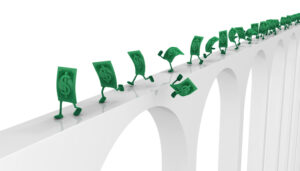America’s ‘Bridge Loan’ Is Up
The comments below are an edited and abridged synopsis of an article by Jim Rickards
Much of the policy response to the Covid-19 pandemic was based on the belief that it would be over quickly. There were multi-trillion-dollar spending bills from March into May. The Fed’s balance sheet went from about $3.8 trillion to around $7 trillion. (Jim can easily envision some scenarios where it goes to $10 trillion).

That was a sort of bridge loan to get from April to July. The expectation was that by July, the pandemic would be under control, the economy would be reopened, there would be a V-shaped recovery, and all would be well before the US election. That hasn’t turned out to be the case.
Congress is debating another bailout package, but there’s no consensus. And that’s important because if you go back to the bridge loan theory, the US will need another to keep the economy and stock market propped up if lockdowns continue.
There is also the possibility of a second wave of Covid-19 infections. What the US is currently experiencing isn’t a second wave; it’s an extension of the first, and Rickards explains why (the initial strain, the Italian strain, a first wave with timing differences, and what a second wave really looks like).
And there’s good evidence that lockdowns don’t work. Death rates in countries with severe lockdowns weren’t appreciably better than in some countries that didn’t fully lock down.
Lockdowns destroy the economy. Some restrictions make sense, but to shut down every nail salon, barbershop, hair stylist, pizza parlor, dry cleaner, et cetera coast to coast is something else entirely.
Small- and medium-sized enterprises are 45% of GDP and almost 50% of jobs. When they shut down, the economy shuts down. And that isn’t necessary. It was never going to stop the problem.
The US won’t see 2019 levels of output until 2023 at the earliest. It won’t see 2019 (low) levels of unemployment until probably 2025. It’s looking at a long, slow recovery—if things don’t get worse. But they could, especially if there is a deadly second wave.
